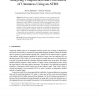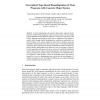2522 search results - page 412 / 505 » From Self-Organized Systems to Collective Problem Solving |
IUI
2005
ACM
14 years 2 months ago
2005
ACM
We present PLIANT, a learning system that supports adaptive assistance in an open calendaring system. PLIANT learns user preferences from the feedback that naturally occurs during...
SAC
2005
ACM
14 years 2 months ago
2005
ACM
Finding rapidly suitable experts in an organization to compose a team able to solve specific tasks is a typical problem in large consulting firms. In this paper we present a Des...
AIED
2005
Springer
14 years 2 months ago
2005
Springer
Analyzing coverage of a student’s utterance or essay (completeness) and diagnosing errors (correctness) can be treated as a diagnosis problem and solved using a well-known techni...
ATAL
2005
Springer
14 years 2 months ago
2005
Springer
In multi-agent systems where sets of joint actions (JAs) are generated, metrics are needed to evaluate these sets and efficiently allocate resources for the many JAs. For the case...
GPCE
2005
Springer
14 years 2 months ago
2005
Springer
Abstract. In meta programming with concrete object syntax, object-level programs are composed from fragments written in concrete syntax. The use of small program fragments in such ...


